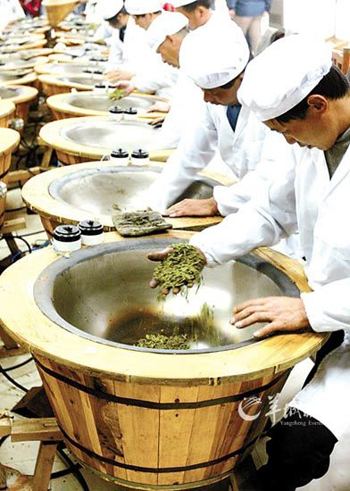Enjoy a cup of tea around the Tomb Sweeping Festival
|
|
|
Staff at Meijiawu Tea Fry Center showg their tea frying skills. [Photo: sina.com] |
2. Emei Xueya Biological Tea Garden
If you visit Emei Mountain in southwest China's Sichuan Province around the time of the Tomb Sweeping Festival, you will likely encounter tea monks picking the tea sprouts in the snow capped mountains. You can learn from experienced teachers about how to pick the youngest tea sprouts. Stir frying the tea is also interesting, along with the graceful tea ceremony performances.
Xueya refers to tea sprouts grown from under the snow. After an exhausting day of tea picking, a cup of Xueya tea will rid you of fatigue and anxiety.
|
|
|
Newly picked tea leaves being aired.[Photo: ycwb.com] |
3. Mt. Dongting, Suzhou. Biluochun green tea.
Mt. Dongting is situated to the southeast of Taihu Lake. It boasts the best Biluochun green tea. Biluochun tea needs to be planted in a mix with peach, plum, persimmon, orange and other fruit trees, so that the tea has a sweet fruity smell. Therefore, when watching the tea trees, you can also enjoy the full blooms of various flowers.
4. Wenxian County, Gansu. Maojian, Longjing, Yuzechun tea.
Wenxian County in west China's Gansu Province is known as an oasis in the vast dry west region. It boasts a great many tea varieties, such as Yuhe Maojian, Liziba Longjing, Yuzechun, to name just a few.
The annual tea festival at Wenxian features an array of song and dance performances, tea skills presentations, and tea related talk shows. And the most attractive thing is a fresh tea auction at which Tea peasants bring out their treasured home grown teas, many of which are of premium quality.
The trip to Wenxian will not disappoint you. You may see many endangered wild species as well as the well-known Yangtang Heaven Lake and Bikou Reservoir will be a highlight your journey. Besides, don't miss the famous local food, Lanzhou noodles.
 0
0 








